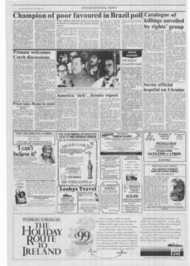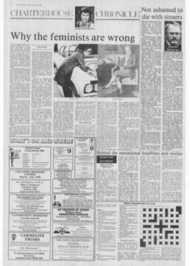Page 3, 3rd November 1989
Page 3

Report an error
Noticed an error on this page?If you've noticed an error in this article please click here to report it.
Tags
Share
Related articles
Church `unsurprised' By Growth In One Parent Families
Bishops Discuss Mixed Marriages
Moral Issues Top Bishops' Agenda
Pope Invites Non-catholics To Rome Talks
Priests' Change Of Style
Home News In Brief
Marriage breakdown on bishops' agenda
by Rita Wall
THE problems of marriage breakdown will be on the agenda at the forthcoming Catholic Bishops Conference of England and Wales meeting from November 13 to 16. The gathering, which takes place twice yearly, will examine the success of the project on marriage and family life instigated by the bishops in 1986.
The initiative, which is now drawing to a close with the publication of the final unit in the resource pack, has been taken up by all the dioceses in the country. "We have now coordinators in every diocese who are responsible for marriage and family life," said Fr John Guest, national chaplain to the Catholic Marriage Advisory Council, and a worker on the bishops' project.
"This was a unique project in that the resource pack which we developed wasn't a set programme," said Fr Guest. "The bishops specifically wanted material which could be used by different dioceses according to their needs".
The marriage materials, Fr Guest said, "were designed to find people where they are at, rather than presenting the should and shouldn'ts approach." The project has succeeded, he felt, in raising marriage as a pastoral priorty. "We have been able to coordinate skill and provide good information in this pack", the national chaplain commented.
The bishops will be anxious to continue the project in some form, said Mgr Vincent Nichols, general secretary of the bishops' conference.
"The bishops will more than likely consult the committee on the project and ask it for recommendations," Fr Guest said. "We are hoping that the bishops will support our research into the need to include and reach out to those who are separated and divorced." He pointed to the feeling of those who have had difficulties in their marital relationship that they "felt left out" by the Church.
It is hoped that not only will the bishops continue support for the project financially, but that they will give a firm commitment to this vital area of pastoral concern in their dioceses. The protection and health of the community depended on the family, emphasised Fr Guest, and this is why the Church secs marriage as a most important institituion.
The bishops are also to discuss at their meeting the future effect of the poll tax. Not dwelling, at this meeting, on the effects of the poll tax on the community at large, the bishops are anxious to clear up specific misunderstandings about how and who will pay poll tax in the diocese.
"There is a considerable amount of confusion among the clergy as to how the priest will pay the poll tax," said Fr Peter Verity of the Catholic Media Office. "It seems likely that the enclosed orders will not have to pay because they do not earn money, and to ask them to contribute would cause financial ruin to many orders who are presently barely surviving.".
Education will also feature high on the bishops' agenda, and Cardinal Basil Hume's analysis of what the Education Reform Act means for Catholic schools which he read to the National Priests' Conference in September, will be discussed. Problems such as the difficulty in recruiting black Catholic teachers for black students will be highlighted.
The bishops will also discuss internal church issues and ecumenical progress in the last few months. The Inter Church Process will be assessed.
That initiative has launched a new Lent course. Called Turning Points, it is the third in a series of Lent programmes sponsored by all the main Christian churches. The first course in 1986 had an estimated one million participants and it is hoped that this year there will be an even greater response.
"As well as being a shared preparation for Easter 1990, Turning Points is a further Opportunity for the essential local participation in the Inter Church Process which will be further celebrated at the national level in September with the inauguration of new ecumenical bodies," said Keith Jenkins, Moderator of the Planning Group for Turning Points and Secretary of the division of Community Affairs at the British Council of Churches.
The course consists of five programmes on audio cassette, backed up by a leaflet written by Fr John Redford of Mottingham, Kent. It is hoped that local radio stations will promote the material.
blog comments powered by Disqus











